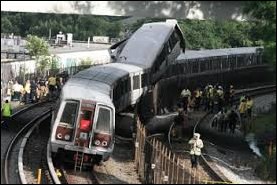 The Washington Metro’s largest union has sent letters to political leaders in Virginia, Maryland, and Washington, D.C. outlining the contract issues behind the union’s veiled threats to conduct an illegal strike. The demands, according to the Washington Post:
The Washington Metro’s largest union has sent letters to political leaders in Virginia, Maryland, and Washington, D.C. outlining the contract issues behind the union’s veiled threats to conduct an illegal strike. The demands, according to the Washington Post:
- Roll back a policy reassigning hundreds of custodians to Metro stations and outsourcing some of the work;
- Reverse rules requiring a 72-hour notice for sick leave;
- Curb Metro’s shift toward private contracting of certain services;
- Drop threat to issue three-day suspensions to workers who participated in a July 12 “late-out” that delayed bus service in parts of the region.
“Our demand is simple: get [General Manager Paul] Wiedefeld to follow the law, abide by the collective bargaining agreement, and bargain in good faith on all matters under his obligation,” the union wrote in its letter.
Seventy-two hour notification for sick leave? That sounds strange. I don’t usually know 72 hours ahead of time that I’m going to be sick, and I don’t expect most union members do either. Otherwise, management seems to be making entirely reasonable demands. The number one priority of the union, of course, is to preserve union jobs and maintain union dues revenue — priorities to which, as a taxpayer and occasional passenger, I am utterly indifferent. But the particulars of the contract are not the issue — the prospect of a strike is what should concern us all.
As Metro management and the union play chicken, Del. Tim Hugo, R-Centreville, has urged in a television interview that Governor Ralph Northam and Attorney General Mark Herring to prepare for a possible strike and the transportation anarchy that will inevitably follow in Northern Virginia:
We’ve called on the Governor to make sure he says something, make sure he jumps into this fight. They should move to challenge it in federal court to uphold the compact, the Governor and the Attorney General, because we have to protect the thousands, literally tens of thousands of people in Northern Virginia who rely on Metro to get to get to work everyday.
The instant a strike is called, the guv and AG need to be ready to file suits, seek injunctions and pursue other remedies to keep the trains and buses rolling. Moreover, they need to let the union know they are ready and willing to act forcefully. Politically speaking, the stakes are much bigger than looking out for the tens of thousands of Virginia Metro riders. Turn those passengers loose on the roads and highways of Northern Virginia, and the entire transportation grid will freeze up. Everyone will be affected. An illegal strike must be shut down as quickly as possible.


